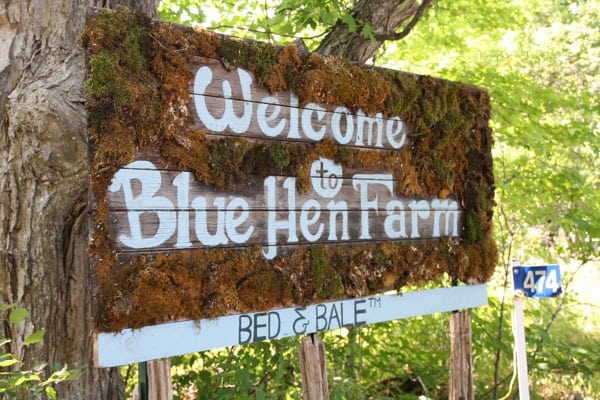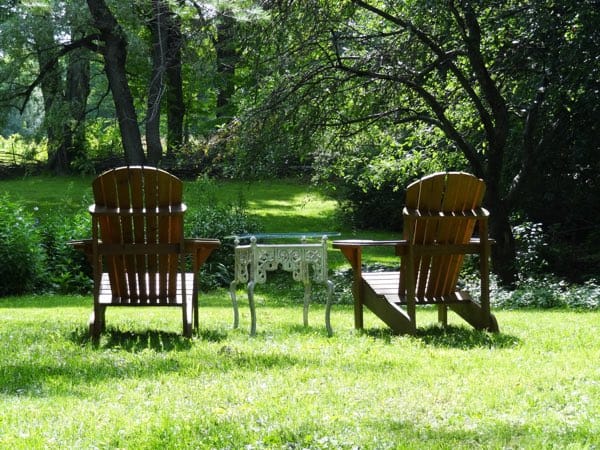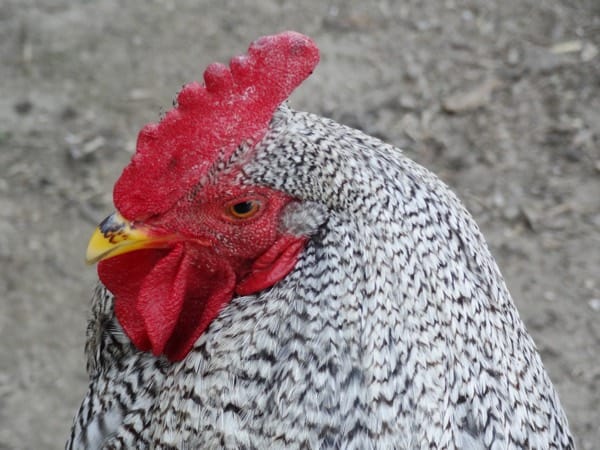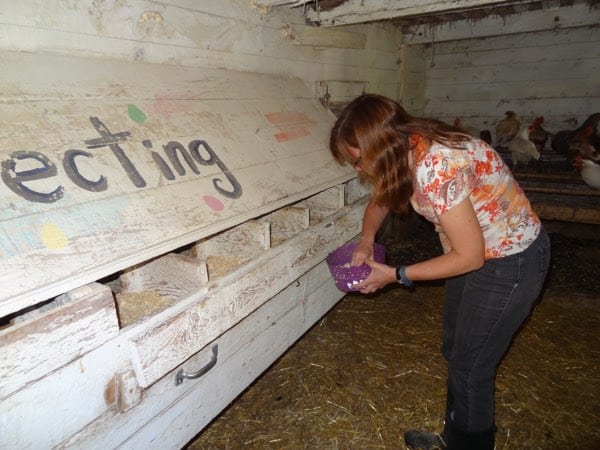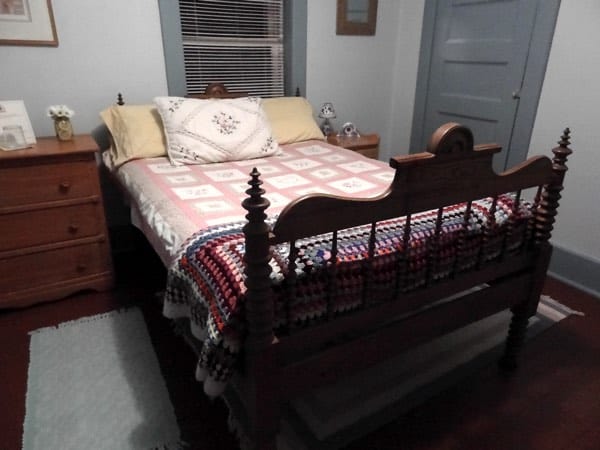When was the last time you collected your breakfast eggs straight from the chicken?
Yeah, me too. I’m a city girl to my core, and if you ask me where eggs come from, my instinctive response is likely to be, “Loblaws.”
That’s the mindset Leslie Ashe has set out to gently change at Blue Hen Farm, a “bed and bale” not far from Almonte in Lanark County. Clayton, the nearest village—more of a crossroads, really—isn’t very large.
When she and her husband bought the property in June 2013, Leslie had recently watched the documentary Food, Inc., a damning indictment of large-scale agribusiness. Inspired by the movie, and remembering the small hobby farm her parents had once owned, she wanted to have a hand in raising food in a healthy, sustainable way.
“At this point in life, you realize there are more days behind you than in front of you,” is how she puts it, with typical pithiness.
Taking in guests wasn’t part of the original plan. But every small farm needs to diversify, and when Leslie started a basic farmstay program in 2014, “people just kind of started coming.”
They came from all over: the stressed-out stockbroker from Manhattan who arrives once a year to keep himself grounded, the Japanese student who wanted to polish her English and non-farmers of all sorts who just want to better understand what life is like on those farms they drive past on the way from point A to point B.
I am clearly among the latter. Although my father spent his early years on a farm, as did several of my grandparents, my experience of farm life has largely been limited to snapping pictures at pioneer villages and buying fruit from roadside stands. In short, I barely know a pig from a pitchfork. Blue Hen Farm seemed like a perfect place to expand my education.
After a day of kayaking, shopping and noshing in Almonte (more on that in a future post), my travelling companion Carly Freeman (of the Ontario Highlands Tourism Organization) and I arrived at the farm late one afternoon in July to a welcome of warm oatmeal cookies and cold lemonade on the porch.
We chatted with Leslie and Jade Armstrong, a local art student, about the history of the house, which was built in 1918 from bricks made on site. Free-range chickens pecked in the yard, with the big-rooster-on-campus periodically crowing to let us all know who was boss. From the big wood stove in the kitchen, delicious aromas of garlic and roasting meat occasionally wafted out to greet us.
Ah, I thought, farm life! So relaxing!
And it can be, for guests, if that’s what they want. No one is required to lift a finger. But most people who stay here are keen to learn how the farm operates, and so were we. So before dinner, we pulled on rubber boots and set off on a small tour to check out everything from the hen house to the pigpens (where piglets were happily wallowing in the mud, as piglets do). I have to admit that we didn’t do any work, aside from collecting some eggs. And yet Leslie rewarded us with a giant farm-style dinner of homemade bread, Caesar salad with smoked salmon, carrot and pear soup, lemon-roasted garlic basil chicken…and side dishes…and dessert…
Groaning happily as I waddled away from the table, I settled into a rocking chair in the living room, where we passed the evening looking through old photos of the family who built the farmhouse and learning their stories. To our delighted surprise, Jade offered to paint our portraits, which made lovely souvenirs of the evening. (She also paints at the Carleton Place farmers’ market, if you’d like a portrait yourself.)
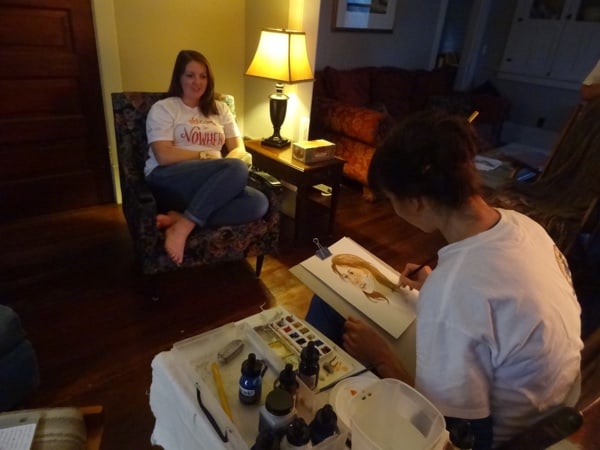
Apologies for the poor quality of this photo (the light was low), but it really captures Jade at work (in this case, painting Carly’s portrait). Photo © Laura Byrne Paquet.
But soon, whether it was due to the kayaking, the big meal or all the fresh air, I realized I was beat, and we all headed to bed.
The three guest bedrooms at Blue Hen Farm are big, clean, comfortable and homey, but if you’re looking for country inn-style luxury, this isn’t your place. It’s a working farm, after all. The furniture is largely a collection of restored antiques.
I slept like a rock and awoke to the smells of yet another giant feast. (When does Leslie sleep? I’m not sure.) Fortified with fresh fruit, pancakes with local maple syrup, homemade granola, bacon and more, we set out to help her with that morning’s duty: shearing the farm’s elderly llama, George. (Sadly, a few weeks after my visit, George passed on.)
My “help” consisted entirely of taking photos, and opening and closing gates and doors while Leslie wheedled and cajoled George from a nearby field into the barn. Carly was much more involved, even helping to hold George’s head during the shearing process.
If they’re interested, guests will find no shortage of chores to do—from feeding chickens to chopping wood—on the 55-acre property. Leslie says she has never been as strong in her life—nor as dirty. “You don’t believe you can smell that bad!” But, she says, the work of running a farm is endlessly satisfying. “I’m happy that my dream is coming true.” Check out the video below for another glimpse into the story of Blue Hen Farm.
[Blue Hen Farm from Nicolai Hadchity on Vimeo.]
If you go
Blue Hen Farm is about an hour west of Ottawa, near the village of Clayton.
Rates per double room range from $125 a night, for just a room and continental breakfast, to $175 a night for the full farmstay experience, including a huge breakfast and dinner and all the chores you want.
Disclosure: The costs of my visit to Blue Hen Farm were covered by Blue Hen Farm and by the Ontario Highlands Tourism Organization, neither of which reviewed or approved this post.

